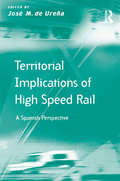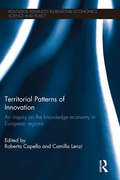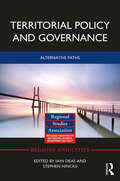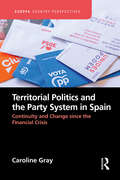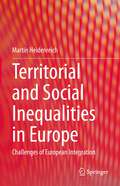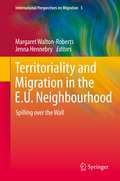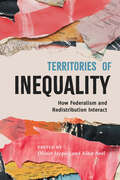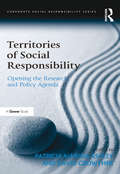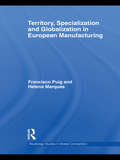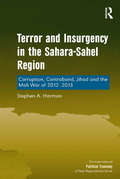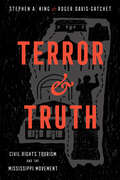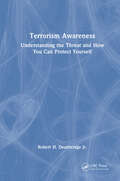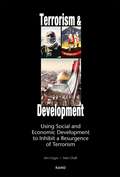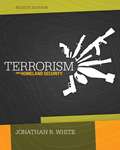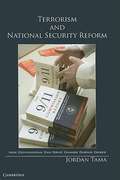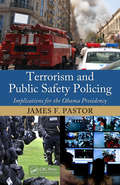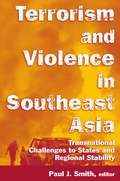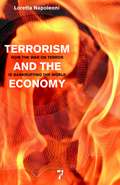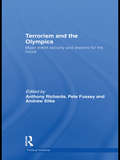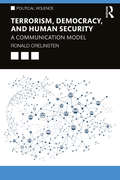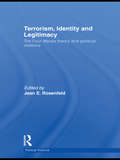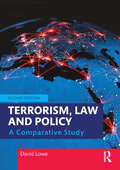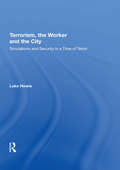- Table View
- List View
Territorial Implications of High Speed Rail: A Spanish Perspective (Transport and Mobility)
by José M. De UreñaHigh Speed Rail's (HSR) main objective is to attract air passengers between big metropolitan areas however the main territorial implications in many cases occur not in these metropolitan areas but in the intermediate cities. These implications open up new spatial planning possibilities such as decentralization, new regional centres and urban renewal projects. This book presents the experience of 20 years of HSR in Spain including some explicit information, arguments and conclusions derived from HSR in other European Countries. It debates the HSR territorial implications at three scales: national, regional and local, thus being of interest for strategic debates at those scales, such as the decision of new national lines, the pros and cons of deviating the line to reach minor intermediate cities or the selection of precise locations for new stations and the development projects in their surroundings. Comparisons with the recent changes in accessibility, spatial distribution of population and activities, are made with mobility for working purposes and with the characteristics of the HSR passengers. This book also examines the actions, strategies and urban projects that medium size cities can use to make best use of HSR opportunities, synthesising the experience of HSR medium cities in Spain and Europe. The book's conclusions will be of interest, over and above scholars, to transport infrastructure decision makers, city and regional planners and managers, and transport companies.
Territorial Patterns of Innovation: An Inquiry on the Knowledge Economy in European Regions (Routledge Advances in Regional Economics, Science and Policy #1)
by Roberta Capello Camilla LenziThis edited volume describes the spatial diffusion of knowledge and innovation using a large dataset at the regional level, and presents scientific evidence on the role of knowledge and innovation on regional development. The empirical results support a new design for innovation policies at the regional level, which could help the European Union to achieve the targets set up in its 2020 Agenda. Today, financial capital, general information, consolidated technologies and codified knowledge are readily available virtually everywhere. However, the ability to organize these ‘pervasive’ factors into continuously innovative production processes and products is by no means pervasive and generalized; rather, it exists selectively only in some places where tacit knowledge is continuously created, exchanged and utilized and business ideas find their way to real markets. Territorial Patterns of Innovation provides evidence that, contrary to popular belief, local knowledge intensity does not necessarily guarantee higher innovation performance. Moreover, the book shows that the growth benefits deriving from innovation do not necessarily match the strength of the formal local knowledge base, and that regions innovating in the absence of a strong local knowledge base can be as successful as more knowledge-intensive regions in turning innovation into a higher growth rate. Together, the contributions in this book offer a new understanding of the relationship between knowledge, innovation and regional performance by delving beyond generally held beliefs. It will be of value to regional scientists, industrial economists and policymakers.
Territorial Policy and Governance: Alternative Paths (Regions and Cities)
by Iain Deas Stephen HincksIn response to both policy and conceptual debates, alternative narratives have begun to emerge about territorial governance and policymaking. As local and regional policy actors strive to respond to the geographically uneven effects of the economic crises of the early twenty-first century, a crucial question emerges: what are the opportunities and challenges presented by alternative forms of territorially based governance and policy? The aim of this edited volume, therefore, is critically to explore the opportunities and challenges presented by different forms of territorial policy and governance. Drawing on conceptual debates and empirical research from the United Kingdom and other international contexts, the contributors engage with issues around the politics and governance of territorial development, economic development, planning and regeneration and the environment. Territorial Policy and Governance addresses the question of how alternative forms of territorial governance and policy can help to shape patterns of urban and regional development, highlighting the related opportunities, constraints and challenges that confront their operationalisation. This book will be essential reading for international audiences with an interest in territorial development, governance, politics, human geography and planning and regeneration.
Territorial Politics and the Party System in Spain: Continuity and change since the financial crisis (Europa Country Perspectives)
by Caroline GrayAcross Western Europe, the global financial crisis of 2008 and its aftermath not only brought economic havoc but also, in turn, intense political upheaval. Many of the political manifestations of the crisis seen in other Western and especially Southern European countries also hit Spain, where challenger parties caused unprecedented parliamentary fragmentation, resulting in four general elections in under four years from 2015 onwards. Yet Spain, a decentralised state where extensive powers are devolved to 17 regions known as ‘autonomous communities’, also stood out from its neighbours due to the importance of the territorial dimension of politics in shaping the political expression of the crisis. This book explains how and why the territorial dimension of politics contributed to shaping party system continuity and change in Spain in the aftermath of the financial crisis, with a particular focus on party behaviour. The territorial dimension encompasses the demands for ever greater autonomy or even sovereignty coming from certain parties within the historic regions of the Basque Country, Catalonia and, to a lesser extent, Galicia. It also encompasses where these historic regions sit within the broader dynamics of intergovernmental relations across Spain’s 17 autonomous communities in total, and how these dynamics contribute to shaping party strategies and behaviour in Spain. Such features became particularly salient in the aftermath of the financial crisis since this coincided with, and indeed accelerated, the rise of the independence movement in Catalonia.
Territorial and Social Inequalities in Europe: Challenges of European Integration
by Martin HeidenreichThis book examines social inequalities in Europe, especially those caused by economic factors. It starts with the paradox of European inequality, where on the one hand, even total income inequality in Europe is significantly lower than in most parts of the world; but on the other, Europe is also characterised by profound and durable inequalities within the continent. It discusses inequalities caused by the exclusion of marginalised groups from the labour market, with considerable and sometimes increasing differences between central and peripheral regions, pronounced wealth and labour market inequalities, and significant rates of persistent poverty, deprivation, educational poverty, low wages and unemployment. The book also discusses broader territorial inequalities, which are the basis for divisions between Northern and Southern Europe, East and West, between qualified and unqualified employees, younger and older people, men and women, and migrants and non-migrants. The book raises questions about the winners and losers of the social transformations linked to the introduction of the Euro, the Eastern enlargement of the EU, and the financial and Eurozone crises. It is based on a comprehensive analysis of a European-wide microdata set on income and living conditions (EU-SILC). The empirical research material, which is the first to deploy this data in a comprehensive manner, consists of detailed empirical analyses of social divisions and Europeanisation processes in 30 European countries. It analyses and explains the transformation of the previously dominant national spaces into a European social space. This topical book is of interest to academics and students in the fields of sociology and comparative social sciences, along with those studying European regional geography, anthropology, international relations, and international politics.
Territoriality and Migration in the E.U. Neighbourhood: Spilling over the Wall
by Margaret Walton-Roberts Jenna HennebryThis volume brings together an interdisciplinary group of scholars around an important question: how has migration changed in Europe as the European Union has enlarged, and what are the consequences for countries (and for migrants themselves) inside and outside of these redrawn jurisdictional and territorial borders? By addressing this question the book contributes to three current debates with respect to EU migration management: 1) that recent developments in EU migration management represent a profound spatial and organizational reconfiguration of the regional governance of migration, 2) the trend towards the externalization or subcontracting of migration control and, 3) how the implications of Europe's changing immigration policy are increasingly felt across the European neighborhood and beyond. Based on new empirical research, the authors in this collection explore these three processes and their consequences for both member and non-member EU states, for migrants themselves, and for migration systems in the region. The collection indicates that despite the rhetoric of social and spatial integration across the EU region, as one wall has come down, new walls have gone up as novel migration and security policy frameworks have been erected - making European immigration more complex, and potentially more influential beyond the EU zone, than ever.
Territories of Inequality: How Federalism and Redistribution Interact (Democracy, Diversity, and Citizen Engagement Series)
by Alain Noël Olivier JacquesThe rise of income and wealth inequality and the possibilities of redistribution animate contemporary social and political debates, but much of the scholarship on the issue is limited to the individual level. There is a spatial dimension to the redistribution of income, however, and in federations, this is especially important.In Territories of Inequality leading political scientists propose a territorial approach to inequality and redistribution, informed by political economy, political geography, and a comparative analysis of federalism and multilevel governance. Chapters explore the relationship between interpersonal and interregional redistribution, the role of progressive or regressive governing coalitions, and the foundations of individual preferences for or aversions to interregional redistribution. They consider different federations and quasi-federations and emphasize the unique situation of Indigenous Peoples, who navigate a complex relationship with institutions shaped by colonialism.Examining how decentralization and federalism influence policy outcomes and public preferences, Territories of Inequality provides new ways to approach the question of redistribution.
Territories of Social Responsibility: Opening the Research and Policy Agenda (Corporate Social Responsibility)
by Patricia Almeida AshleyCSR is a fragile concept if conceived only at the organizational level or driven only by leadership will. Many writers deal with aspects of social responsibility, but most deal with it as this kind of organizational and voluntary initiative. Few address the wider policy agenda. The contributors to Territories of Social Responsibility - researchers and practitioners from four continents - all participated in an international workshop co-ordinated by Patricia Almeida Ashley as part of her role as Chair in Development and Equity at the International Institute of Social Studies. They form a policy network contributing to studies on the concept of a multi-actor, multilevel and territorial approach to social responsibility and governance, oriented towards global, regional or local development and equity goals. This book introduces a new conceptual framework and promotes a research and policy agenda relating to it. A new model sees CSR embedded in institutional and legal frameworks, communicated and understood through a vector of communication and knowledge influencing situated culture and social values, and classified into three levels of ethical challenges. All of this can be expressed into the social processes of education, governance, the development of civil society, and policy making - a renovation of the existing perspectives on the concept of social responsibility. This ground breaking book integrates conceptual and empirical contributions and opens a research and policy agenda for the future. It will appeal to academics, higher level students, policy makers, and to leaders of and advisors to organizations affected by social responsibility issues.
Territory, specialization and globalization in European Manufacturing (Routledge Studies In Global Competition Ser. #51)
by Francisco Puig Helena MarquesAlthough traditional manufacturing (textiles, clothing, footwear, furniture, etc) has been in decline in developed countries, it still represents an important part of European employment due to its labour-intensive character. Moreover, its geographical concentration particularly exposes certain regions of Europe to job loss as the industry declines. This book provides an explanation for the differences observed in the impact of globalization which is based on the influence of the territory and of the production specialization of the firms. The conclusions presented in the book are withdrawn from a detailed study of the Spanish textile-clothing sector. The book highlights the intensity of the relationship between the organizational model of the territory where the firms are located (high concentration of interrelated firms in a well-defined geographical area called "industrial district"), the specialization strategy implemented and the globalization of the economy. It also suggests the need to consider those factors as interdependent determinants of firm performance, particularly given the current trend for firms to simultaneously concentrate geographically and multilocalize domestically and internationally. The proposed methodology of analysis can be used to study other manufacturing sectors in other European countries.
Terror and Insurgency in the Sahara-Sahel Region: Corruption, Contraband, Jihad and the Mali War of 2012-2013 (The International Political Economy of New Regionalisms Series)
by Stephen A. HarmonHarmon focuses on terrorism and insurgency in the lawless expanse of the Sahara Desert and the adjacent, transitional Sahel zone, plus the broader meta-region that includes countries such as Algeria, Mali, and Nigeria, and to a lesser extent, Niger and Mauritania. Covering such issues as Islamist terrorism, border insecurity, contraband, and human trafficking, this book looks at the interrelated problems of political and social pathologies that affect terrorist movements and security in the region. A valuable publication, it treats a series of related problems on the basis of a broadly defined area, with a special emphasis on the role of Islam as both a moderating and exacerbating factor. The book has a broader appeal than more narrowly focused country studies that derive from the perspective of only one problem such as terrorism or border insecurity.
Terror and Truth: Civil Rights Tourism and the Mississippi Movement (Race, Rhetoric, and Media Series)
by Stephen A. King Roger Davis GatchetStephen A. King and Roger Davis Gatchet examine how Mississippi confronts its history of racial violence and injustice through civil rights tourism. Mississippi’s civil rights memorials include a vast constellation of sites and experiences—from the humble Fannie Lou Hamer Museum in Ruleville to the expansive Mississippi Civil Rights Museum in Jackson—where the state’s collective memories of the movement are enshrined, constructed, and contested. Rather than chronicle the history of the Mississippi Movement, the authors explore the museums, monuments, memorials, interpretive centers, homes, and historical markers marketed to heritage tourists in the state. Terror and Truth: Civil Rights Tourism and the Mississippi Movement is the first book to examine critically and unflinchingly Mississippi’s civil rights tourism industry. Combining rhetorical analysis, onsite fieldwork, and interviews with museum directors, local civil rights entrepreneurs, historians, and movement veterans, the authors address important questions of memory and the Mississippi Movement. How is Mississippi, a poor, racially divided state with a long history of systemic racial oppression and white supremacy, actively packaging its civil rights history for tourists? Whose stories are told? And what perspectives are marginalized in telling those stories? The ascendency of civil rights memorialization in Mississippi comes at a time when the nation is reckoning with its racial past, as evidenced by the Black Lives Matter movement, Mississippi’s adoption of a new state flag, the conviction of former members of the Ku Klux Klan, and the removal of Confederate monuments throughout the South. Terror and Truth directly engages this national conversation.
Terror in Global Narrative
by George Fragopoulos Liliana M. NaydanThis is a collection of interdisciplinary essays that examines the historical, political, and social significance of 9/11. This collection considers 9/11 as an event situated within the much larger historical context of late late-capitalism, a paradoxical time in which American and capitalist hegemony exist as pervasive and yet under precarious circumstances. Contributors to this collection examine the ways in which 9/11 changed both everything and, at the same time, nothing at all. They likewise examine the implications of 9/11 through a variety of different media and art forms including literature, film, television, and street art.
Terrore a Wall Street
by Kenneth Eade Federico Greco100% di possibilità di fallimento, ma la speranza di una previsione. Uno “shock and awe” feroce che mescola fiction e non-fiction dallo scrittore di best seller che la critica ha salutato come ‘uno dei più robusti autori di thriller sulla scena’. Siamo nel 2020 e il mondo è sull’orlo del collasso economico. Riusciranno a salvarci un gruppo di studenti prodigio guidati da un professore di economia con la testa fra le nuvole e una ragazza di 24 anni? Il crollo del marcato azionario ha generato un effetto domino di proporzioni disastrose. Le banche sono fallite e la gente si ribella per le strade delle città ormai in fiamme. Blackout enormi hanno ceduto il passo a definitivi errori di sistema. Il professore di Economia dell’università di Chicago, Harry Mason, consigliere dei presidenti degli Stati Uniti e del Dipartimento del Tesoro, ha riunito il suo dream team, ‘i genietti’, tra i più brillanti laureati in economia, in un corso sperimentale speciale. La loro missione: salvare il mondo. Ma forse è troppo tardi. Il romanziere Kenneth Eade e il saggista Gordon L. Eade fanno squadra per offrirci un thriler di meta fiction pensato per mostrarci come sopravvivere al prossimo crollo. Ecco cosa dice la critica di questo thriller finanziario: “Un omaggio a un padre e un altro romanzo di prima classe da Kenneth Eade!” Grady Harp, Top 100, Hall of Fame and Vine Voice Ed ecco cosa pensano i lettori di questo libro rivelazione sull’economia mondiale: “Se avessi letto questo libro 30 anni fa, oggi avrei molti più soldi in banca. Non lasciatevi ingannare dal fatto che è scritto come un romanzo. La fiction è utilizzata semplicemente per illuminare i fatti. Userò alcune di queste informazioni per migliorare i profitti dei miei investimenti.” L. Klopping “Dovrebbero leggerlo tutti, ho imparato tanto. 2020: l’economia mondiale sta collassando. Questo libro e tutti gli
Terrorism Awareness: Understanding the Threat and How You Can Protect Yourself
by Robert H. Deatherage, Jr.Terrorism Awareness: Understanding the Threat and How You Can Protect Yourself provides readers a foundational understanding of the threats that face us every day.The goal is to introduce readers to different tactics and techniques used by terrorists—both international and domestic—to better understand personal protection concepts and, if necessary, take actions to make themselves "hard targets" that terrorist organizations will want to avoid. This includes providing a background on understanding how terrorists operate, and, more specifically, how to recognize the pre-incident indicators associated with terrorist operations. Coverage includes situation awareness of the phases of terrorist operations, common attacks, surveillance and targeting tactics, kidnapping and hostage situations, bombings and blast effects, hijacking, armed assaults, and more. With such awareness, readers can be alert to common cues to avoid dangerous situations, as well as familiarize themselves with various actions they can take to better protect themselves. Sometimes certain events may arise which are unavoidable and, in those cases, learning how to best mitigate those scenarios can mean life or death and provide the best opportunity for safety and survival. Terrorism Awareness is a helpful guide to provide anyone working or traveling in the United States or overseas—particularly in potentially volatile places subject to terrorism or civil unrest—the tools they need to recognize potential threats and to keep themselves, and those they are with, safe.
Terrorism and Development: Using Social and Economic Development to Inhibit a Resurgence of Terrorism
by Peter Chalk Kim CraginThis report examines the social and economic development policies enacted by three countries--Israel, the Philippines, and the United Kingdom--to inhibit a resurgence of terrorism within their jurisdictions. Drawing on a broad research base, including numerous first-hand interviews, the authors outline the initiatives implemented by each country then assess their effectiveness, with the aim of informing U.S. decisionmakers of the benefits and pitfalls of such initiatives as they develop policy to counter terrorism.
Terrorism and Homeland Security (Eighth Edition)
by Jonathan R. WhiteWritten by acclaimed national terrorism expert Jonathan R. White, the market-leading TERRORISM AND HOMELAND SECURITY is widely recognized as the most comprehensive, balanced, and objective terrorism book available. In the Eighth Edition, White continues to provide a theoretical and conceptual framework that enables readers to understand how terrorism arises and how it functions. Packed with cutting-edge coverage, the book discusses the most sophisticated theories of the world's best terrorist analysts, while still focusing on the domestic and international threat of terrorism and the basic security issues surrounding terrorism today.
Terrorism and National Security Reform
by Jordan TamaTerrorism and National Security Reform demonstrates that blue-ribbon commissions can be powerful vehicles for policy change, overturning the conventional wisdom that views them only as devices for passing the buck. Jordan Tama explains how the unique political credibility of commissions can enable them to forge bipartisan consensus on tough policy challenges. He also shows that commissions are most valuable during a crisis, when policymakers face pressure to make changes but frequently cannot agree on what to do. Using an original database, case studies, and more than 200 interviews of policymakers and commission participants, Tama reveals how commissions have shaped Barack Obama's plan for ending the Iraq War, spurred the largest government and intelligence overhauls since 1947, and driven many other elements of U.S. counterterrorism policy. In an era of unrelenting partisanship and extreme polarization, this book shows that commissions are increasingly valuable policymaking tools.
Terrorism and Public Safety Policing: Implications for the Obama Presidency
by James F. PastorThe trends, data, and battle-tested logic don't lie. A perfect storm of extremist ideologies is on the horizon that threatens to challenge the current state of public safety forcing police chiefs, public administrators, and security professionals to rethink their approach to policing the streets of America. Professor James Pastor, a recognized auth
Terrorism and Violence in Southeast Asia: Transnational Challenges to States and Regional Stability
by Paul J. SmithThis timely work examines the scale and root causes of terrorism across Southeast Asia, including the role of al-Qaeda's ascendancy in the region. It begins with an overview of the analytical and theoretical framework for discussing the subject. Individual chapters then examine terrorist activities from both functional and country-specific perspectives. The book traces fundamental linkages between terrorism and security issues, such as illegal immigration, narcotics trafficking, and other criminal activity. In addition, it considers the issue of convergence - the growing connection between criminal groups and terrorism, and how this may facilitate future violence. Written by a range of experts in the field, the individual chapters reflect a variety of perspectives. The contributions fall into two broad categories - chapters that directly address terrorism (the groups, their ideologies, their modus operandi, their origins, and state responses to them); and chapters that address the "enabling environment" that exists in Southeast Asia (the role of transnational crime, porous borders, convergence between terrorism and crime).
Terrorism and the Economy: How the War on Terror is Bankrupting the World
by Loretta NapoleoniEconomist and best-selling author Loretta Napoleoni traces the link between the finances of the war on terror and the global economic crisis, finding connections from Dubai to London to Las Vegas that politicians and the media have at best ignored. In launching military and propaganda wars in the Middle East, America overlooked the war of economic independence waged by Al-Qaeda. The Patriot Act boosted the black market economy, and the war on terror prompted a rise in oil prices that led to food riots and distracted governments from the trillion-dollar machinations of Wall Street. Consumers and taxpayers, spurred by propaganda fears, were lured into crushing global debt. Napoleoni shows that if we do not face up to the many serious connections between our response to 9/11 and the financial crisis, we will never work our way out of the looming global recession that now threatens our way of life.While we feared that Al-Qaeda might destroy our world, Wall Street ripped it apart.
Terrorism and the Olympics: Major Event Security and Lessons for the Future (Political Violence)
by Anthony RichardsThe book aims to outline the progress, problems and challenges of delivering a safe and secure Olympics in the context of the contemporary serious and enduring terrorist threat. The enormous media profile and symbolic significance of the Olympic Games, the history of terrorists aiming to use such high-profile events to advance their cause, and Al Qaeda's aim to cause mass casualties, all have major implications for the security of London 2012. Drawing on contributions from leading academics and practitioners in the field the book will assess the current terrorist threat, particularly focusing on terrorist targeting and how the Olympics might feature in this, before addressing particular response themes such as transport security, the role of surveillance, resilient designing of Olympic sites, the role of private security, and the challenge of inter-agency coordination. The book will conclude by providing an assessment of the legacy of Olympic security to date and will discuss the anticipated issues and dilemmas of the future. This book will be of interest to students of terrorism studies, security studies, counter-terrorism and sports studies.
Terrorism, Democracy, and Human Security: A Communication Model (Political Violence)
by Ronald CrelinstenThis book examines the relationship between terrorism and counterterrorism and how it operates within the broader context of communication, control, power, and democratic governance at the national, international, and transnational level. A culmination of decades of research on the challenges that liberal democracies face in dealing with terrorism, this work provides an innovative framework that maps out the broader context in which terrorism and counterterrorism interact and co-evolve – the terrorism–counterterrorism nexus. In a series of models moving from local to global perspectives, the framework places this nexus within the broader context of social, cultural, political, and economic life. This framework provides a tool for maintaining situational awareness in a multi-tiered, networked world where geography and history are splintering into a rainbow of perspectives and locales, revealing the contested nature of space and time themselves. This book will be of much interest to students of political violence, terrorism studies, communication studies, and international relations, as well as security professionals.
Terrorism, Identity and Legitimacy: The Four Waves theory and political violence (Political Violence)
by Jean E. RosenfeldThis book argues that terrorism in the modern world has occurred in four "waves" of forty years each. It offers evidence-based explanations of terrorism, national identity, and political legitimacy by leading scholars from various disciplines with contrasting perspectives on political violence. Whether violence is local or global, it tends to be both patterned and innovative. It elicits chaos, but can be understood by the application of new models or theories, depending upon the methods and data experts employ. The contributors in this volume apply their experiences and studies of terrorists, mob violence, fashions in international and political violence, religion’s role in terrorism and violence, the relationship between technology and terror, a recurring paradigm of terrorist waves, nation-states struggling to establish democratic/elective governments, and factions competing for control within states - in order to make sense of both national and international acts of political violence and to ask and answer some of the most disturbing questions these phenomena present. This book will be of much interest to students of terrorism, religion and violence, nationalism, sociology, war and conflict studies and IR in general.
Terrorism, Law and Policy: A Comparative Study
by David LoweTerrorism, Law and Policy: A Comparative Study is a textbook offering a comparative study of the terrorism-related legislation, policy and practice introduced from international governmental bodies such as the UN and the European Union, and individual states, with a focus on Australia, Canada, New Zealand, the UK and the US. It offers a uniquely legal perspective on key themes relating to terrorism and security. This new edition is brought fully up to date with the ever-changing developments in terrorist activity, as well as in states’ approaches to anti-terrorism legislation and policy. It includes new chapters on the far-right and extreme far-right cause, one on offering a comparative study of the anti-terrorism policies of states and international bodies, and the role of international and national counter-terrorism agencies, planning and preparing acts of terrorism and a new chapter on freedom of expression, hate crime and proscribing groups as terrorist organisations. Terrorism, Law and Policy: A Comparative Study is ideally suited for terrorism and security modules at undergraduate and postgraduate levels, and will also be of interest to practitioners working on the legal aspects of these areas.
Terrorism, the Worker and the City: Simulations and Security in a Time of Terror
by Luke HowieSoon after watching the twin towers falling in New York, some of those with business responsibilities were already asking themselves whether people would be willing to work in tall buildings ever again. Is work too risky? How can people be expected to attend work in what might now be seen as precarious and vulnerable workplaces and cities? Although, thankfully, large scale terrorist attacks are infrequent, the world's cities, and the businesses to which they are home, have been put on notice that it can come to any place at any time. In Terrorism, the Worker and the City, Luke Howie considers what steps managers and employees can and should take to protect their businesses from such an amorphous and indefinable threat. Deftly combining theoretical insight with empirical research, he reveals how, despite an appearance of 'business as usual', fear; anxiety; and suspicion permeate workplaces, even in cities that may not be at the top of any terrorist group's target list. Using the Australian city of Melbourne, a cosmopolitan city and major business centre with nearly four million people, as a metaphor for other such cities around the world, Dr Howie's research has uncovered that even where they don't perceive a high level threat, business managers who might face having to account for themselves to some post event Inquiry have taken action in consequence of the situation. Often, that action amounts to the introduction of what can be described as 'Simulated Security'. This cannot ever provide certain protection from terrorist attack, but it may be the best we can reasonably do. There is also evidence that it can be effective in terms of providing the reassurance to counter the terrorist objective of disrupting normal life through fear. With its rigorous research compared with other more speculative works on this subject, Terrorism, the Worker and the City will appeal to city and business leaders and managers, and security professionals, as well as those in governmenta
